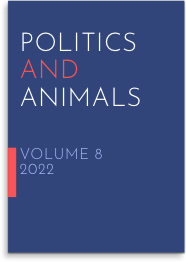Abstract
The article sees politics as aimed at happiness, happiness as dependent on sentience, and animals, the bringers of sentience, as the baseline of politics. Since class, as a relationship of unequal power, destroys happiness, the animal class, having the least power, is also the baseline of class. Partly accepting animals’ positioning as working-class or slaves, but rejecting their classification as super-exploited parts of nature, the article identifies the animal class as subaltern, in respect of powerlessness, epistemic injustice, moral and political invisibility, and colonization. As the lowliest, the animal class defines class itself, providing the strongest argument for its dissolution.
References
- Allan, V. (2019). The push for pastures new. The National, 10–14.
- Armstrong, P. (2002). The postcolonial animal. Society & Animals, 10(4), 413–419.
- Aristotle (350 BCE). Nicomachean Ethics, W. D. Ross (Trans.). Retrieved from http://classics.mit.edu/Aristotle/nicomachaen.1.i.html
- The Badger Trust (2020). Can the cull. https://www.badgertrust.org.uk
- Chaplin, J. E. (2017). Can the nonhuman speak?: Breaking the chain of being in the Anthropocene. Journal of the History of Ideas, 78(4), 509–529. doi: https://doi.org/10.1353/jhi.2017.0029
- Compassion in World Farming (2021). Action Urged at COP 26. https://www.ciwf.org.uk/news/2021/11/action-urged-at-cop26
- Curran, D. (2016). Risk, power, and inequality in the 21st Century. Basingstoke, Hampshire/New York, NY: Palgrave Macmillan.
- Forestry and Land Scotland (2020). Deer Manage-ment Strategy. https://forestryandland.gov.scot/what-we-do/who-we-are/corporate-information/deer-management-strategy
- Francione, G. L. (1995). Animals, property, and the law. Philadelphia, PA: Temple University Press.
- Fricker, M. (2007). Epistemic injustice. Power and the ethics of knowing. Oxford, Oxfordshire, England: Oxford University Press.
- Gramsci, A. (2021 [1934]). Subaltern social groups. A criti-cal edition of Prison Notebook 25. (J. A. Buttigieg, & M. E. Green, Ed. & Trans.). New York, NY: Columbia University Press.
- Green, C. (2018). Ministers urged to investigate “sickening” wild goat hunting trip on Scottish island. inews. https://inews.co.uk/news/scotland/ministers-urged-investigate-sickening-scottish-hunting-trip/
- Green, M. E. (2021) Introduction. In Gramsci (2021[1934]), Subaltern Social Groups. A critical edition of Prison Notebook 25 (J. A. Buttigieg, & M. E. Green, Ed. & Trans.) (pp. xxi-li). New York, NY: Colum-bia University Press.
- Haider, A., & Mohandesi, S. (2011). The prince and the pauper. Jacobin. https://www.jacobinmag.com/2011/08/the-prince-and-the-pauper
- Haslett, D. W. (1985). Does the difference principle really favour the worst off? Mind, 94(373), 111–115. Retrieved from https://www.jstor.org/stable/2254704
- Horkheimer, M. (1978). Dawn and Decline (M. Shaw, Trans.). New York: The Seabury Press. Retrieved from https://cominsitu.files.wordpress.com/2021/04/horkheimer-dawn-and-decline.pdf
- Hribal, J. (2003). “Animals are part of the working class”: A challenge to labor history. Labor History, 44(4), 435–453. doi: 10.1080/0023656032000170069. Retrieved from https://www.tandfonline.com/doi/pdf/10.1080/0023656032000170069?needAccess=true
- Jane Goodall Institute USA. (2009). Jane Goodall’s chimp greeting. UTube. https://www.youtube.com/watch?v=Vr350j7Ya5E
- Jessop, B. (2014 [2012]). Marxist approaches to power. In E. Amenta, K. Nash, & A. Scott (Eds.), The Wiley-Blackwell Companion to Political Sociology (pp. 3–14). Oxford, England: Blackwell. 2012. Retrieved from: http://www.miguelangelmartinez.net/IMG/pdf/2012_Jessop_Marxist_Approaches_to_Power___chapter-2.pdf
- Kobylecky, J. (2015). Understanding the land ethic. The Aldo Leopold Foundation. https://www.aldoleopold.org/post/understanding-land-ethic/
- Kymlicka, W. (2019). Human supremacism: Why are animal rights activists still the “orphans of the left”? New Statesman. The Staggers. Retrieved from https://www.newstatesman.com/politics/staggers/2019/04/human-supremacism-why-are-animal-rights-activists-still-orphans-left
- Leopold, Aldo (1949). A Sand County almanac. New York: Oxford University Press. Retrieved from http://www.umag.cl/facultades/williams/wp-content/uploads/2016/11/Leopold-1949-ASandCountyAlmanac-complete.pdf
- Liguori, G. (2015). Conceptions of subalternity in Gramsci. In Mark McNally (Ed.), Antonio Gramsci. Critical Explorations in Contemporary Political Thought (pp. 118–133). Retrieved from https://link.springer.com/search?facet-series=%2214934%22&facet-content-type=%22Book%22
- Marx, K. (1887 (English); 1867 (German)). Capital, Volume I (S. Moore and E. Aveling (Trans.) and, F. Engels (Ed.). Moscow: Progress Publishers. Re-trieved from https://www.marxists.org/archive/marx/works/download/pdf/Capital-Volume-I.pdf
- Marx, K. (1937 [1885]). The Eighteenth Brumaire of Louis Bonaparte. Moscow: Progress Publishers. Retrieved from https://www.marxists.org/archive/marx/works/download/pdf/18th-Brumaire.pdf
- Marx, K., & Engels, F. (1968 [1845–1846]). A Critique of The German Ideology. Moscow: Progress Publishers. Retrieved from https://www.marxists.org/archive/marx/works/download/Marx_The_German_Ideology.pdf
- Marx, K., & Engels, F. (1969 [1848]). Manifesto of the Communist Party. In S. Moore, & F. Engels (Trans.), Marx/Engels Selected Works, Volume 1 (1888) (pp. 98–137). Moscow: Progress Publishers. Retrieved from https://www.marxists.org/archive/marx/works/download/pdf/Manifesto.pdf
- Masson, J., & McCarthy, S. (1996). When Elephants Weep. London, England: Vintage.
- Podosky, P.-M. (2018). Hermeneutical injustice and an-imal ethics: Can nonhuman animals suffer from hermeneutical injustice? Journal of Animal Ethics, 8(2), 216–228.
- Preece, R. (2005). Brute souls, happy beasts, and evolution: The historical status of animals. Vancouver and Toron-to, Canada: UBC Press.
- Scully, M. (2020). The animal-protection movement is every-thing that “woke” activism isn’t. National Review. https://www.nationalreview.com/2020/10/the-animal-protection-movement-is-everything-that-woke-activism-isnt/?fbclid=IwAR1qo01msRKTXxvakrPKLSfVX3copi-zX13fJbtQ9jxWWQ7TC1mtVuNFwWQ
- Shalev, M. (2007). Animal Enterprise Terrorism Act becomes law. Lab Animal, 36, 15. Retrieved from https://www.nature.com/articles/laban0107-15a
- Skabelund, A. (2019). Can the subaltern bark? Cornell University Press. https://www.cornellpress.cornell.edu/can-the-subaltern-bark/
- Spivak, G. C. (1988). Can the subaltern speak? In C. Nelson & L. Grossberg (Eds.), Marxism and the In-terpretation of Culture. Basingstoke, England: Macmil-lan Education, pp. 271–313. Retrieved from http://abahlali.org/files/Can_the_subaltern_speak.pdf
- Stache, C. (2019). Conceptualising animal exploitation in capitalism: Getting terminology straight. Capital & Class. Retrieved from https://journals.sagepub.com/doi/abs/10.1177/0309816819884697
- Starostinetskaya, A. (2021, November 2). Eric Adams Makes History as New York City’s First Vegan Mayor. Veg News. https://vegnews.com/2021/11/eric-adams-new-york-city-vegan-mayor
- Thompson, E. P. (2013). The Making of the English Working Class. London, England: Penguin Classics.

